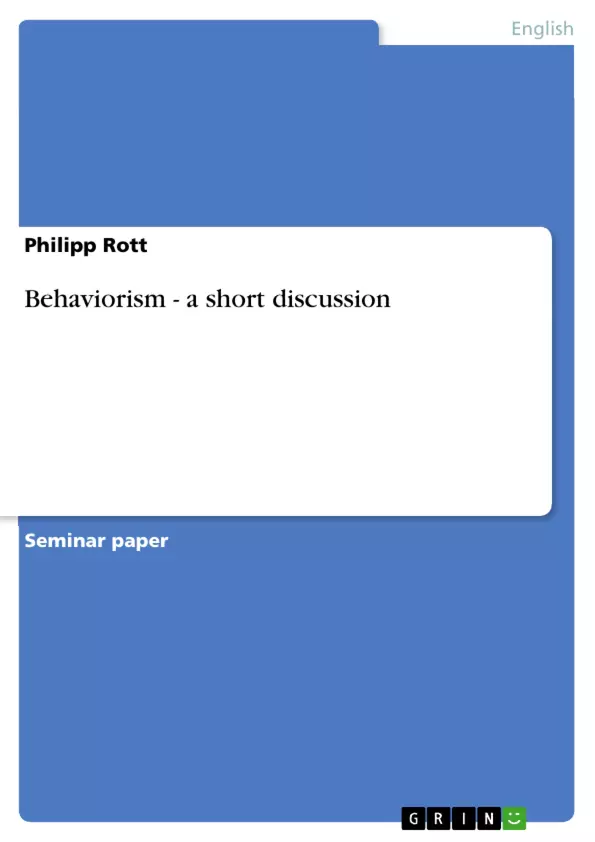How do children learn to speak? And why? Do all children start to use language at some age? Or do they need a certain “trigger”? Is our ability to use a language innate? Or are we conditioned to use language as a response to our environment? There are many other questions to be raised, for example about the function of a language, the process of acquisition, or the meaning of the term “language” as such. Psycholinguistics tries to answer at least some of these questions.
“Psycholinguistics is the name given to the study of the psychological processes involved in language. Psycholinguists study understanding, producing, and remembering language. […][They are] concerned with listening, reading, speaking, writing, and memory for language […] [and] interested in how we acquire language, and the way in which it interacts with other psychological systems.” (Harley, 1995: p.1)
Thus, psycholinguistics is concerned with “(…) the correlation between linguistic behaviour and psychological processes thought to underlie that behaviour (…)” (Crystal, 1992: p. 291).
Due to its interdisciplinary nature, psycholinguistics has been influenced both by linguistic and psychological findings and theories. One of the main psychological schools which have contributed to psycholinguistic theories is behaviourism. Although early behaviourism was not concerned with language as such, but rather with the observation of any (animal or human) behaviour, Burrhus Frederic Skinner (1904-1990) later focussed his interest on verbal behaviour. He employed behaviouristic methods and tried to describe the acquisition process as a complex form of conditioning. One of his aims was to apply his findings in the development of new teaching methods.
This paper is designed to give a brief overview on behaviouristic key terms and ideas. Due to its importance for psycholinguistic aspects, the main focus will be on Skinner’s behaviourism, although the “roots” of behaviourism will also be mentioned shortly. The concluding part of this paper deals with Skinner’s theories on verbal behaviour and the controversy they aroused. Some of the most common critical remarks concerning Skinner’s ideas will be presented and commented upon.
Table of Contents
- Introduction
- Early Behaviourism
- The Formative Period
- Skinner's Behaviourism
- Operant Conditioning
- Verbal Behaviour
- Controversy
- Summary
- Literature
Objectives and Key Themes
This paper aims to provide a concise overview of behaviouristic key terms and ideas, particularly focusing on Skinner's behaviourism and its influence on psycholinguistic theories. It examines how behaviourism, influenced by early research in classical conditioning, attempted to explain language acquisition as a form of learned behaviour.
- Early Behaviourism and its Focus on Observable Behaviour
- The Influence of Pavlov's Classical Conditioning on Behaviouristic Theory
- The Role of Skinner's Operant Conditioning in Explaining Verbal Behaviour
- The Controversy Surrounding Skinner's Theories on Verbal Behaviour
- The Impact of Behaviourism on Language Acquisition Theories and Teaching Methods
Chapter Summaries
- Introduction: This section introduces the field of psycholinguistics, exploring questions about language acquisition and the role of innate abilities versus environmental conditioning. It highlights the interdisciplinary nature of psycholinguistics and the influence of behaviourism on its development.
- Early Behaviourism: This chapter focuses on the origins of behaviourism, emphasizing John B. Watson's emphasis on observable behaviour and the rejection of introspection. It also introduces Ivan Pavlov's research on classical conditioning and its impact on Watson's ideas.
- The Formative Period: This section explores the period in the 1950s when both behaviourism and structuralism in linguistics were interested in deriving theoretical constructs from observable data. It describes the impact of behaviourism's emphasis on rigorous scientific methodology on psycholinguistic research.
- Skinner's Behaviourism: This chapter delves into the work of B. F. Skinner, a prominent behaviourist who explored the concept of operant conditioning. It distinguishes Skinner's work from Pavlov's classical conditioning, highlighting the focus on "emitted" responses and the role of environmental factors in shaping behaviour.
Keywords
Key terms and concepts explored in this text include: behaviourism, psycholinguistics, language acquisition, classical conditioning, operant conditioning, verbal behaviour, Skinner, Watson, Pavlov, introspection, observable behaviour, environmental factors, stimulus-response, learning theory.
Frequently Asked Questions about Behaviorism
What is B.F. Skinner's contribution to psycholinguistics?
Skinner focused on verbal behavior and described language acquisition as a complex form of operant conditioning, where environmental factors shape linguistic responses.
What is the difference between classical and operant conditioning?
Classical conditioning (Pavlov) involves reflex responses to stimuli, while operant conditioning (Skinner) focuses on voluntary behaviors that are reinforced or punished by the environment.
How did early behaviorists view the study of the mind?
Early behaviorists like John B. Watson rejected introspection and focused solely on observable behavior as the only scientific way to study psychology.
Why are Skinner's theories on verbal behavior controversial?
Critics argue that behaviorism fails to account for the innate creative capacity of human language and the internal mental processes involved in speaking.
What is psycholinguistics?
It is the study of the psychological processes involved in understanding, producing, and acquiring language.
- Quote paper
- Philipp Rott (Author), 2000, Behaviorism - a short discussion, Munich, GRIN Verlag, https://www.grin.com/document/45359



